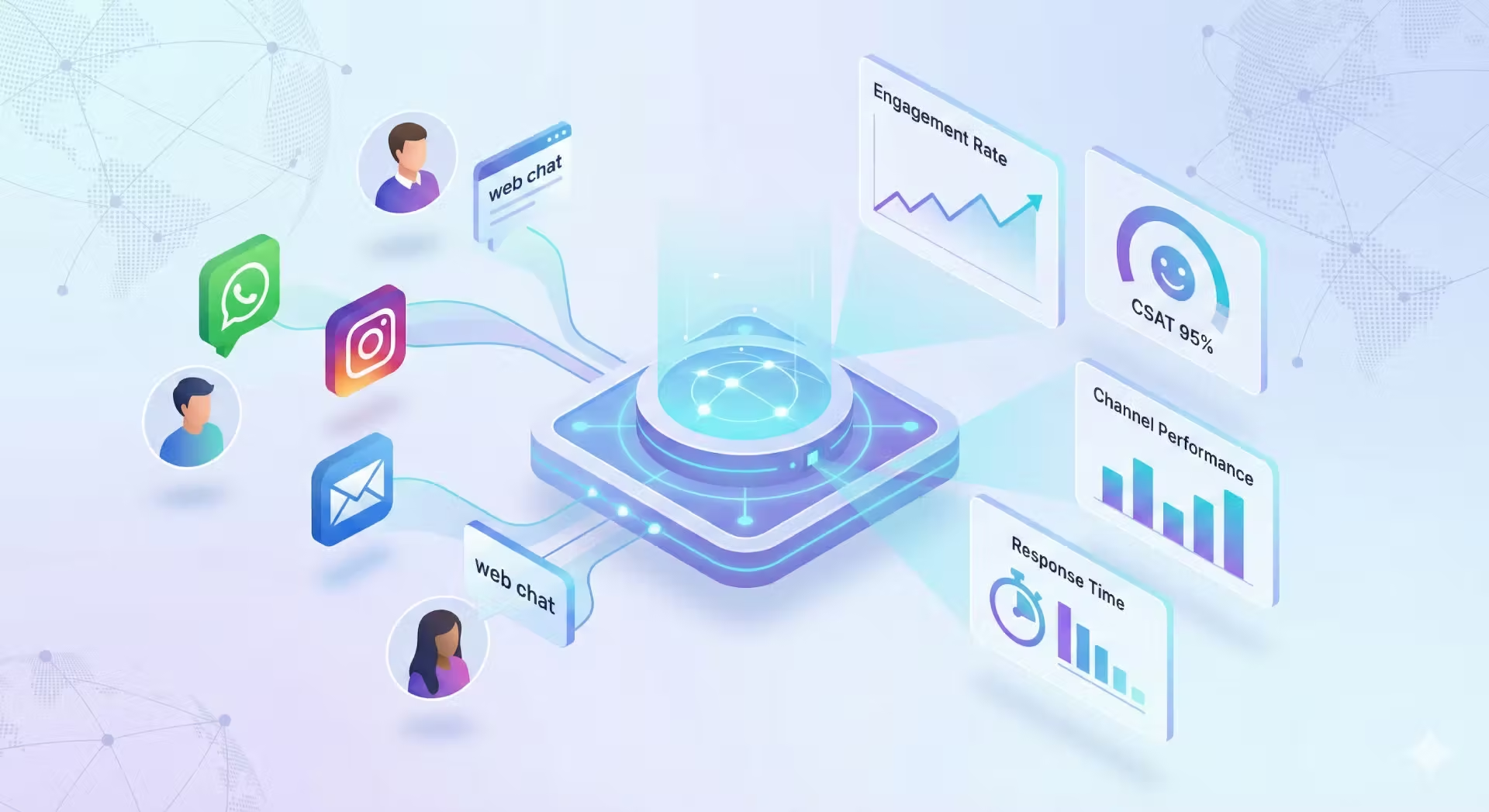Managing customer conversations is the key to building lasting relationships in today’s consumer market.
Did you know that 71% of consumers aged 16-24 believe that quick responses drastically improve their customer experience? This is where an automated ticketing system shines. It ensures that no customer request goes unanswered, while streamlining how inquiries are handled.
What is an automated ticketing system?
Imagine a customer reaching out with a question. Instead of manually figuring out where their inquiry goes, an automated ticketing system steps in. Using AI and automation, these systems route, prioritise, and track every incoming request, sending them to the right person in your team, who has the best skills to answer them.
This process, called automated ticket routing, prevents delays and reduces the risk of errors, allowing support teams to focus on resolving issues rather than organising them. Traditional systems often involve a lot of manual work, which can lead to longer wait times and missed inquiries. Automation, on the other hand, ensures every conversation is routed to the right person and resolved efficiently, improving customer experience.
With features like conversation tracking and real-time categorisation, automated systems transform the support process from reactive to proactive. This empowers your teams to deliver exceptional service.
How do AI-powered ticketing systems impact businesses?
AI-powered ticketing systems have the power to transform your customer support by improving efficiency, reducing costs, and ensuring a better customer experience. These systems are designed to help you scale your help desk operations without compromising on quality.
Here’s how they make an impact:
AI-guided self-service
Imagine a support system that empowers customers to solve issues themselves. Over 60% of customers prefer self-service tools like AI-driven chatbots. These intelligent bots leverage Natural Language Processing (NLP) to respond to common questions in seconds.
By resolving Tier 0 and Tier 1 inquiries—simple issues like account access or FAQs—AI-guided self-service ensures that support agents remain focused on more critical tasks. This helps to clear the helpdesk backlog and also give customers instant solutions without waiting to connect with a person.
Automatic Ticket Escalation
AI isn’t here to replace your human team members, it's a tool that can be used to support them. Automatic escalation ensures that complex queries are seamlessly routed to the right team without manual intervention. Tickets requiring specific expertise are prioritised and assigned, while inactive tickets can be archived to maintain an organised workflow.
With fewer repetitive tasks and a cleaner helpdesk, team members have more time to resolve challenging issues, boosting team productivity and morale.
Omnichannel messaging & knowledge
In today’s multichannel world, customers expect support across platforms like email, chat, and social media. AI-powered ticketing systems unify these interactions into a single, accessible hub.
Whether a customer starts with an email, moves to a live chat, and ends with a phone call, all information such as purchase history and past inquiries will be stored together. This omnichannel approach ensures consistent, personalised support while giving customer service staff the data and tools they need to resolve issues.
Top 6 automated ticketing systems reviewed
Choosing the right automated ticketing system will depend on your business's needs and goals. Below are six of the best automated ticketing platforms that each has their own advantages and might be a good fit for your business.
1. Trengo
Trengo is designed to simplify customer interactions by centralizing them across multiple channels like email, WhatsApp, and Instagram. With intelligent routing, automated workflows, and an easy-to-navigate interface, it empowers teams to deliver fast and meaningful responses. Trengo also integrates seamlessly with tools like Shopify and HubSpot, making it perfect for scaling businesses.
- What makes it stand out: Omnichannel excellence combined with great automation tools for a consistent customer experience.
- Pros: Simple setup, scalable, ideal for teams of all sizes.
- Cons: Advanced data visualisation options could be expanded.
- Pricing: Starting from €299 per month for 10 users
2. Zoho Desk
Zoho Desk is a flexible help desk solution that integrates with the broader Zoho ecosystem, making it a good choice for businesses already using Zoho apps. Its automated workflows and ticket categorisation streamline support processes, while its AI assistant “Zia” provides smart insights.
- What makes it stand out: Comprehensive customisation options and AI-driven insights.
- Pros: Multichannel support, affordable pricing tiers.
- Cons: Some users find the interface outdated.
- Pricing: Starts with a free version available.
3. Jira service management
Jira Service Management combines IT service and help desk functions in one powerful platform. Known for its customisable workflows, it’s a good choice for enterprises looking to integrate support into their wider IT systems.
- What makes it stand out: Integration with IT service management (ITSM) tools for technical and customer support.
- Pros: Advanced SLA management, flexible workflows.
- Cons: Complexity can overwhelm smaller teams.
- Pricing: Starts at $19.04 per agent / month, with a free version available.
4. Freshdesk
Freshdesk is a go-to for businesses seeking simplicity and scalability. It offers shared inboxes for team collaboration, ticket merging, and automation features to manage high volumes of inquiries.
- What makes it stand out: Seamless collaboration tools for cross-departmental support.
- Pros: Scalable self-service options, unified ticketing.
- Cons: Performance can lag under heavy ticket loads.
- Pricing: Starts at $18/agent/month, with a free plan available.
5. Help scout
Help Scout focuses on providing proactive customer service with features like rule-based automation and canned responses. Its simple interface and customer-centric design make it an attractive option for small and mid-sized businesses.
- What makes it stand out: Customer-first design with useful messaging tools.
- Pros: Easy-to-use, actionable analytics.
- Cons: Limited scalability for larger teams.
- Pricing: Starts at $50 for 100 contacts per month and unlimited users.
6. LiveAgent
LiveAgent is an all-in-one support solution offering ticket management, live chat, and a call center. Its hybrid ticketing feature collects inquiries from multiple channels into one unified thread, helping teams stay organised.
- What makes it stand out: Hybrid ticketing system that consolidates multichannel inquiries.
- Pros: Multichannel support, advanced automation rules, knowledge base integration.
- Cons: User interface could be modernised.
- Pricing: Starts at $15/agent/month, with a free plan available.
3 Easy ways to implement automated ticketing software
Integrating automated ticketing software into your business doesn’t have to be overwhelming. By following these three steps, you can set yourself up for success:
1. Integrate an AI ticketing system
The first step is choosing a system that fits your business needs. Look for AI-powered tools that integrate seamlessly with your existing tech stack, such as CRM or communication platforms. Smooth integration ensures that your workflows are uninterrupted while getting all the benefits of automation.
2. Configure a ticketing solution
Tailor your system to align with your support goals. Set up rules for ticket routing, categorisation, and escalation. Customise workflows to ensure that every inquiry reaches the right person at the right time. Don’t forget to train your team on the new system to maximise efficiency.
3. Set a target for success
Define clear goals for your ticketing system, whether it’s faster resolution times, improved customer satisfaction scores, or reduced agent workload. Use the system’s analytics to track progress and refine your approach over time, ensuring continuous improvement.
By implementing an automated ticketing system strategically, your business can enhance efficiency, improve customer relationships, and set the stage for scalable growth.
Benefits of automated ticketing systems
Automated ticketing systems help you streamline customer support and transform how your business connects with its audience. Here’s how adopting one can make a lasting impact:
Loyal customers
Happy customers are loyal customers. Automated ticketing ensures every query is handled promptly, reducing wait times and frustration. By routing conversations to the right person instantly, customers receive tailored, efficient support. This builds trust and satisfaction, which are the foundation of long-term loyalty.
Talent & retention
Burnout is one of the leading causes of employee turnover in customer service. Automated ticketing systems minimize repetitive tasks, allowing your team to focus on meaningful conversations. When employees feel empowered and supported, they’re more likely to stay, fostering a stable and skilled support team.
Scalable helpdesk support
As businesses grow, so do the number of customer inquiries. Automated systems scale effortlessly to handle increasing volumes, maintaining efficiency without requiring significant additional resources. Whether it’s handling hundreds or thousands of conversations, an automated solution keeps the helpdesk running smoothly, no matter the demand.
Get started with an automated ticketing system
An automated ticketing system is becoming a necessity for any business aiming to deliver exceptional customer experiences. By streamlining processes, enhancing team productivity, and fostering customer loyalty, these systems provide the foundation for scalable and efficient support.
If you’re ready to transform your customer conversations and take your support strategy to the next level, look no further than Trengo. Designed to centralise communication across channels and empower teams with smart automation, Trengo stands out as the best solution for businesses seeking to simplify operations and enhance customer satisfaction.




.png)











